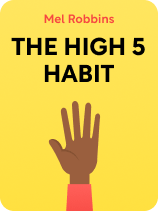

This article is an excerpt from the Shortform book guide to "The High 5 Habit" by Mel Robbins. Shortform has the world's best summaries and analyses of books you should be reading.
Like this article? Sign up for a free trial here.
Are negative thoughts clouding your mind? How should you deal with negative emotions?
Negative thoughts are tied to complicated underlying emotions like fear, doubt, jealousy, and guilt. In The High 5 Habit, Mel Robbins argues that addressing the emotions at their root will better equip you to interrupt the negative thoughts that stem from those emotions.
Check out more on how to deal with negative emotions that lead to negative self-talk.
Reframe Unproductive Emotions
Learning how to deal with negative emotions can be challenging, considering how powerful they are. However, it’s possible to get them under control.
The first emotion is fear, which is one of the biggest barriers to people pursuing their dreams. Robbins explains that people are most often afraid of failure, especially when it comes to going after what they want most. But she suggests that you only fail when you don’t act to create the life you want. If there’s something you’ve always wanted to do, you’re the one who has to take steps to make it happen. She suggests that instead of letting fear paralyze you, reframe your fear as motivation to take action. Try setting a deadline or writing down the steps you need to take to accomplish your goals. According to Robbins, the key is to take a step toward your dream. No matter how small that step is, it has the potential to move you from fear to action.
(Shortform note: In Goals!, motivational speaker Brian Tracy suggests that expanding your knowledge is another tool to overcome fear. Tracy says educating yourself about what you fear and developing your skills will increase your competence and confidence in dealing with any situation you’re struggling with. However, be aware that information-gathering can also be used as a form of procrastination to delay acting on your goals.)
The second emotion that leads to negative self-talk is doubt. In the pursuit of your dreams, you’re bound to have moments of doubt where you wonder if you’re capable of tackling the challenges you face. Instead of listing the reasons why you aren’t ready or able, reframe the challenge as a learning experience. Robbins argues that each setback has the potential to teach you something that you need to know. Reframing doubt as a normal part of the growth process and an opportunity for self-reflection allows you to shift your focus from paralyzing uncertainty to curiosity and possibility.
(Shortform note: The ability to reframe a challenge as a learning experience is an example of what psychologist Carol Dweck calls a growth mindset. In Mindset, Dweck explains that a growth mindset is a belief in your capacity for growth and improvement. People with a growth mindset embrace challenges, seek feedback, and constantly strive to reach their full potential, viewing setbacks as valuable opportunities for growth. Dweck argues that cultivating a growth mindset not only leads to personal and intellectual development but also enhances motivation, achievement, and overall well-being. By believing in your capacity for growth and improvement, she explains, you’re more likely to fulfill your potential and thrive in all parts of your life.)
The third emotion is jealousy. It’s natural to compare ourselves to others and to feel jealous. Robbins explains that while many people think of jealousy as something to be avoided, the feeling can actually be a useful source of information. She argues that jealousy is a tool that helps show you what you want and what you deserve. If you’re jealous of something, it means that’s something that you want. So instead of wallowing in jealousy, use it. Try to reframe jealousy as inspiration. If you want something, what do you need to do to get it? Robbins recommends using the people you’re jealous of as a resource. For example, if you’re jealous of a friend who has launched a new business, don’t talk about them—talk to them. They have the potential to be a valuable source of advice and mentorship. She reiterates that someone else’s success or happiness doesn’t limit your potential for success or happiness. There’s plenty to go around.
| How to Approach Jealousy In The Book of Joy, Desmond Tutu and the Dalai Lama offer additional strategies to address jealousy. Like Robbins, Tutu suggests that you can use jealousy as motivation. He also suggests counteracting jealousy by practicing gratitude for what you already have. The Dalai Lama, on the other hand, identifies jealousy as a negative emotion that you can and should avoid before it even arises. Jealousy, he explains, is born out of consumer culture. So if you focus more on the acquisition of experience and knowledge rather than material items, you’re less likely to suffer from jealousy. He also recommends the Buddhist practice of mudita, or sympathetic kindness—celebrating the successes and happiness of others—explaining that joy isn’t a limited resource, and someone else’s joy should increase your joy, not diminish it. |
The last emotion that can lead to a flood of negative thoughts is guilt. Robbins differentiates between two types of guilt—informative guilt (what Robbins calls productive guilt), which informs you when you’ve done something wrong that you need to fix, and unhelpful guilt (what Robbins calls unproductive guilt or shame), which makes you feel like you’re bad because of a mistake you’ve made. If you don’t know what kind of guilt you’re experiencing, ask yourself if what you’re feeling is helping you grow or making you feel worse about yourself. If it’s the latter, you’re probably suffering from unhelpful guilt.
(Shortform note: In The Power of Vulnerability, Brené Brown refers to unhelpful guilt as shame, an insecurity that attaches to self-identity and causes people to feel unworthy or unloveable. According to Brown, shame thrives on secrecy, silence, and judgment. Because of this, shame feels isolating even though it’s a universal experience. Brown suggests that empathy is the most powerful antidote to shame because it fosters connection, vulnerability, and understanding. She argues that by practicing empathy toward yourself and others, you can create an environment of compassion and acceptance that supports shame resilience and promotes emotional well-being.)
Robbins emphasizes that unproductive guilt is often self-imposed and frequently stems from the decision to prioritize your needs over those of other people. For example, you might feel guilty when you think about making someone angry, hurting them, or disappointing them. Instead, try to reframe the guilt as gratitude. For example, if you feel guilty for showing up late to a meeting because of a flat tire, you can reframe your guilt as gratitude for your colleague’s understanding and patience.
| Additional Benefits of Gratitude According to the Dalai Lama and Desmond Tutu, gratitude is accepting and appreciating what exists without focusing on what you wish were different. In The Book of Joy, they explain that gratitude not only remedies negative emotions, like guilt but is a foundational practice of joy. Contrary to popular belief, they explain, gratitude doesn’t stem from happiness; happiness increases the more that gratitude is expressed. Furthermore, gratitude extends its benefits to others. They suggest that when individuals perceive lack or scarcity, their fear drives them to self-centered behavior. However, cultivating gratitude enables people to see the abundance in the world, fostering a willingness to act generously and compassionately toward others. Research supports this claim, indicating that regular expressions of gratitude are associated with greater empathy, helpfulness, and generosity within social networks. |

———End of Preview———
Like what you just read? Read the rest of the world's best book summary and analysis of Mel Robbins's "The High 5 Habit" at Shortform.
Here's what you'll find in our full The High 5 Habit summary:
- Why you should start each day by giving your reflection a high five
- How to silence self-doubt and adopt an attitude of confidence and self-love
- The psychology behind why high fives make you feel good






